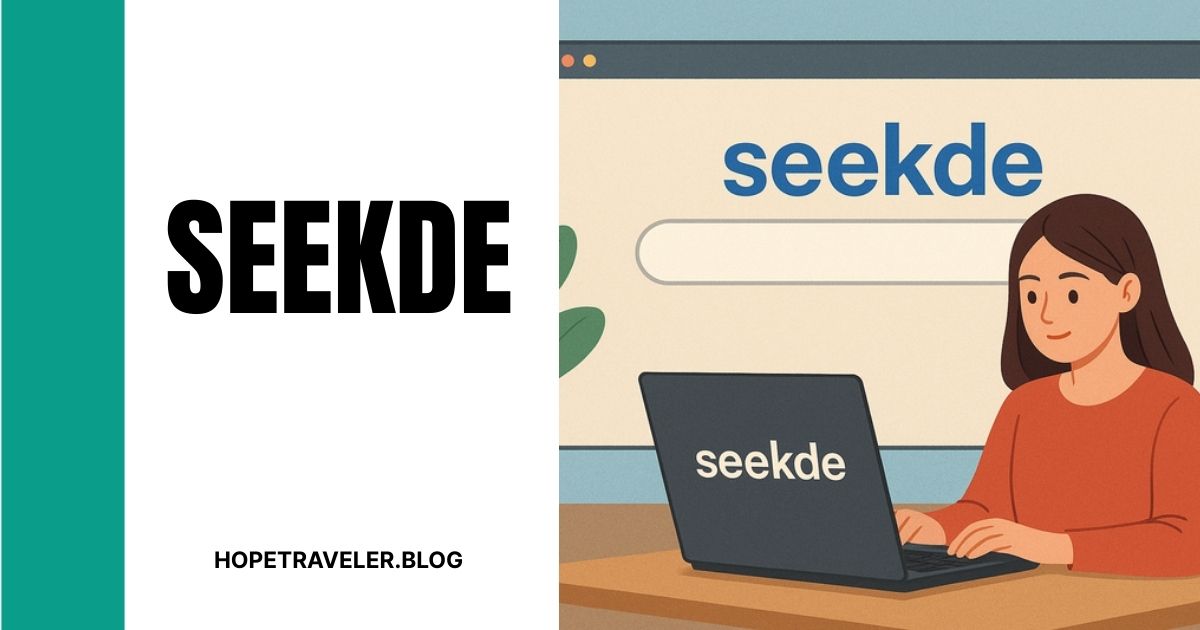Seekde is a term that has gained attention in discussions related to digital culture, technology, and online platforms. While the word itself does not yet have a widely established definition in mainstream dictionaries, it is increasingly being associated with concepts of search, exploration, and discovery. In many online contexts, seekde is linked to the idea of finding information, resources, or opportunities in the digital space.
What is Seekde?
Seekde can be viewed as a concept derived from the idea of “seeking”—to look for or to search. In modern usage, it is closely tied with digital platforms where users actively search for content, services, or opportunities.
In particular, seekde reflects how search engines, databases, and online tools empower people to find exactly what they are looking for in a matter of seconds. Whether it’s information, images, videos, or services, seekde symbolizes the digital journey of discovery.
Historical Roots of Seeking in the Digital Age
The practice of seeking information is not new. For centuries, people relied on libraries, books, and oral traditions to acquire knowledge. However, with the rise of the internet and search engines, seeking took on a new form.
The development of search engines like Google, Yahoo, and Bing revolutionized how humans interact with knowledge. Seekde, as a term, can be interpreted as the modern embodiment of this long-standing human curiosity—now amplified by technology.
The Importance of Seekde in Everyday Life
In the digital era, seekde has become essential to daily life. People use it in many different ways:
- Education – Students and teachers rely on online searching to access study material, research papers, and tutorials.
- Work and Business – Professionals use seekde to find clients, tools, and market insights.
- Entertainment – Users search for movies, music, and games.
- Shopping – E-commerce depends heavily on search features to help customers find products.
- Health – People often seek health-related information, symptoms, and remedies online.
Seekde, therefore, represents more than a simple act of searching; it reflects the growing reliance on digital ecosystems.
Seekde and Search Engines
One of the clearest connections of seekde is with search engines, the backbone of internet exploration. A search engine allows users to input queries and instantly receive results.
Key functions that tie into seekde include:
- Keyword searches to find specific content.
- Indexing to organize billions of web pages.
- Ranking algorithms that deliver the most relevant results.
- Personalized suggestions that make seeking more efficient.
Thus, seekde can be understood as the user experience of interacting with search engines to fulfill curiosity and needs.
Cultural and Social Dimensions of Seekde
Seekde is not just technological—it also has cultural meaning. In today’s interconnected world, seeking online has transformed how people interact socially:
- Social Media: Users constantly seek connections, friends, and trending content.
- Globalization: Seekde allows cultures to connect, exchange ideas, and share traditions.
- Identity and Expression: Many seek communities that match their interests, values, or lifestyles.
In this sense, seekde bridges technology with human behavior, making it both a technical and cultural phenomenon.
Challenges of Seekde
While seekde makes life easier, it also presents several challenges:
- Information Overload – The vast amount of data online can make seeking overwhelming.
- Misinformation – Not everything found online is reliable; false information spreads quickly.
- Privacy Concerns – Searching online often means leaving digital footprints.
- Algorithm Bias – Search results can be influenced by algorithms that favor certain sources.
These challenges highlight the need for digital literacy and awareness when engaging with seekde.
Seekde in Business and Marketing
For businesses, seekde is at the heart of digital marketing strategies. Companies depend on how people search for products or services to design their campaigns.
- SEO (Search Engine Optimization) ensures businesses appear in top results.
- Pay-per-click advertising relies on search queries.
- Customer Insights are gathered from what people seek online.
Seekde therefore is not only a user behavior but also a powerful business tool.
Psychological Impact of Seekde
Psychologists have noted that the ability to seek and instantly find information online shapes human cognition:
- It boosts curiosity by rewarding search behavior with quick answers.
- It may reduce long-term memory reliance, as people depend on search engines instead of remembering.
- It provides a sense of control, as users feel empowered to find anything.
- However, it may also cause anxiety, especially when overwhelming amounts of information appear.
Seekde, therefore, influences how people think, learn, and adapt to the digital world.
Future of Seekde
With advancements in artificial intelligence, voice recognition, and predictive technology, the future of seekde will evolve further:
- Voice Search – Using digital assistants like Siri or Alexa for seeking.
- AI-Powered Search – Smarter, more personalized results.
- Visual Search – Finding products or information by uploading pictures.
- Decentralized Search – Privacy-focused alternatives to mainstream engines.
These innovations suggest that seekde will continue to transform how humans interact with digital knowledge.
Conclusion
Seekde is more than just a word—it symbolizes the modern process of seeking, searching, and discovering in a digital landscape. From education to entertainment, from business to personal growth, seekde touches every aspect of life. Closely tied with the history and development of search engines, it reflects humanity’s timeless quest for knowledge, now empowered by technology.
As digital tools continue to evolve, seekde will play an even greater role in shaping how people find information, connect with others, and navigate the complexities of the modern world.




